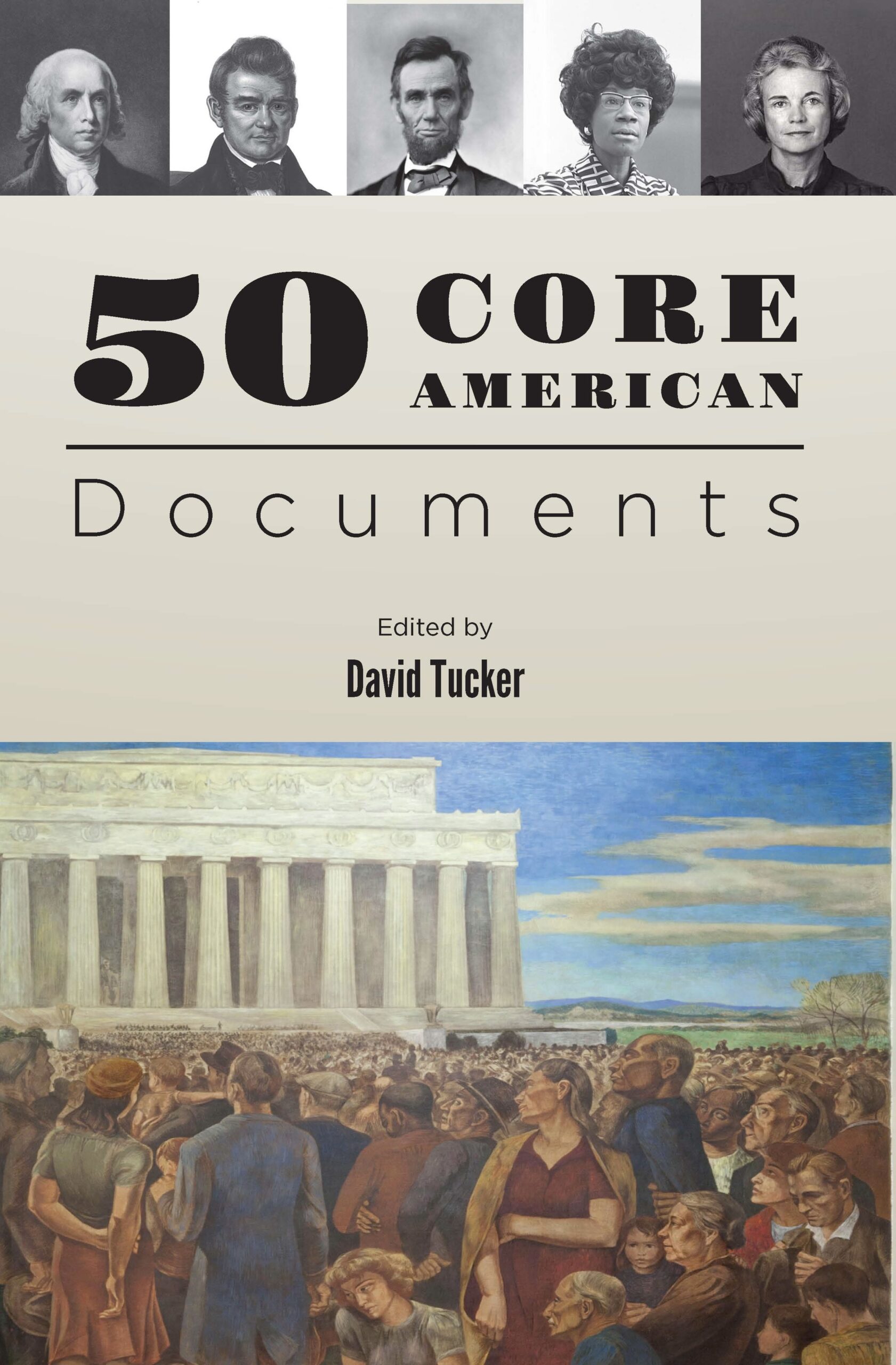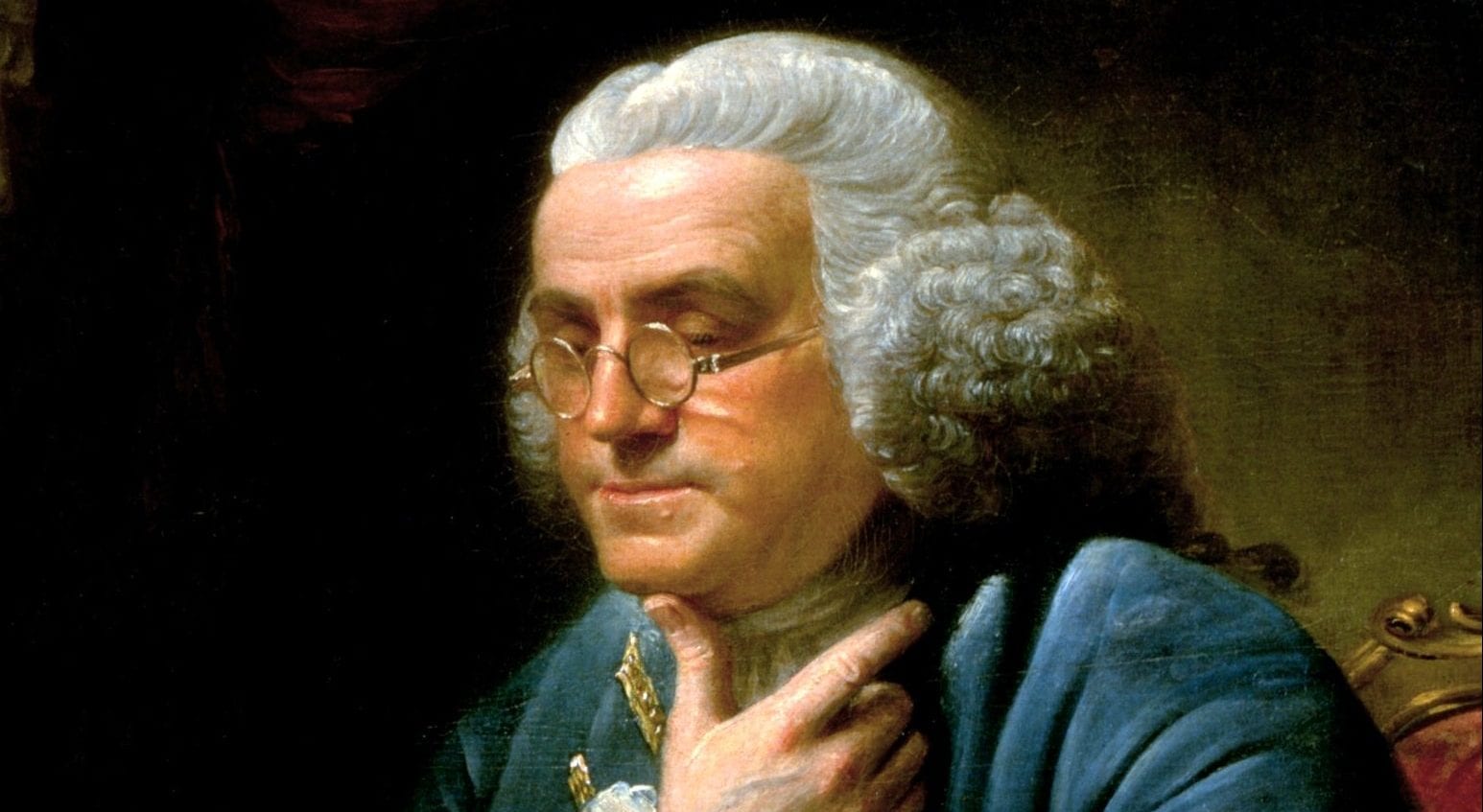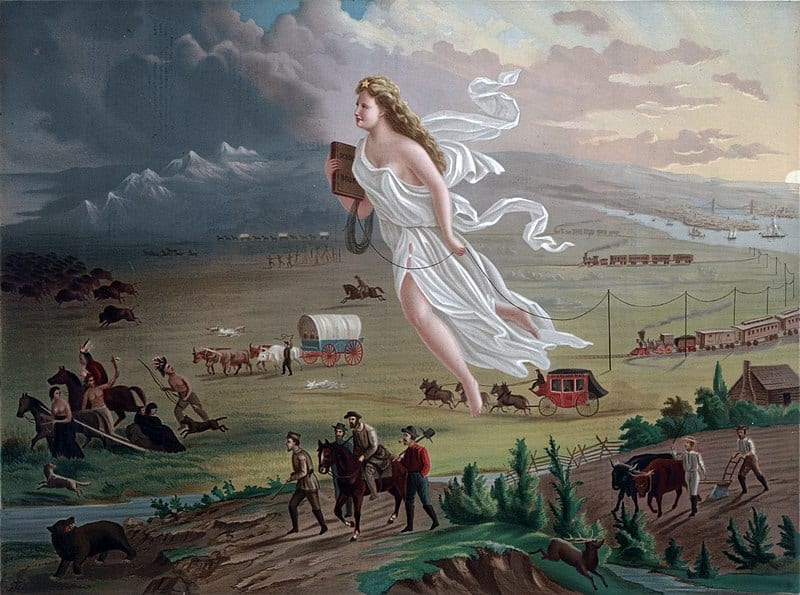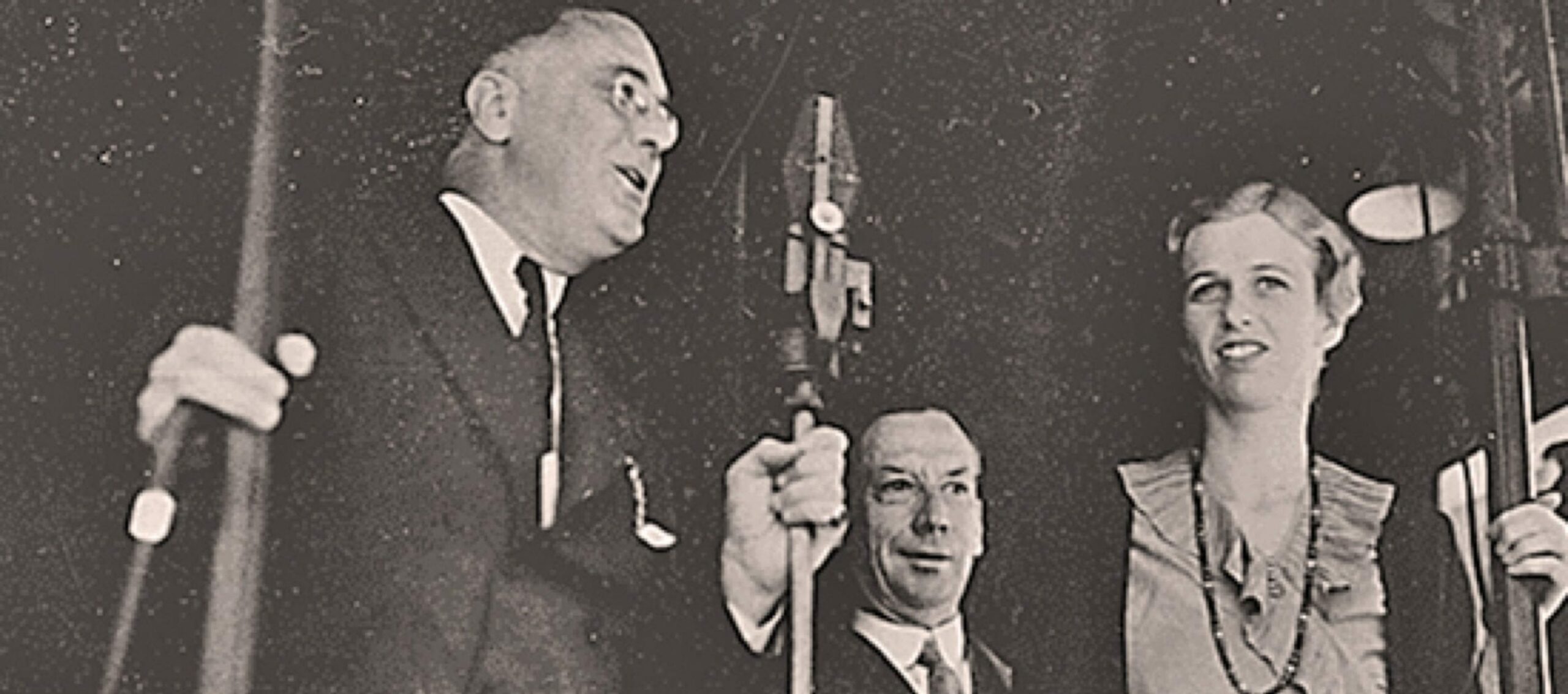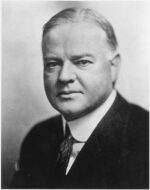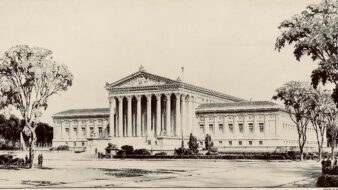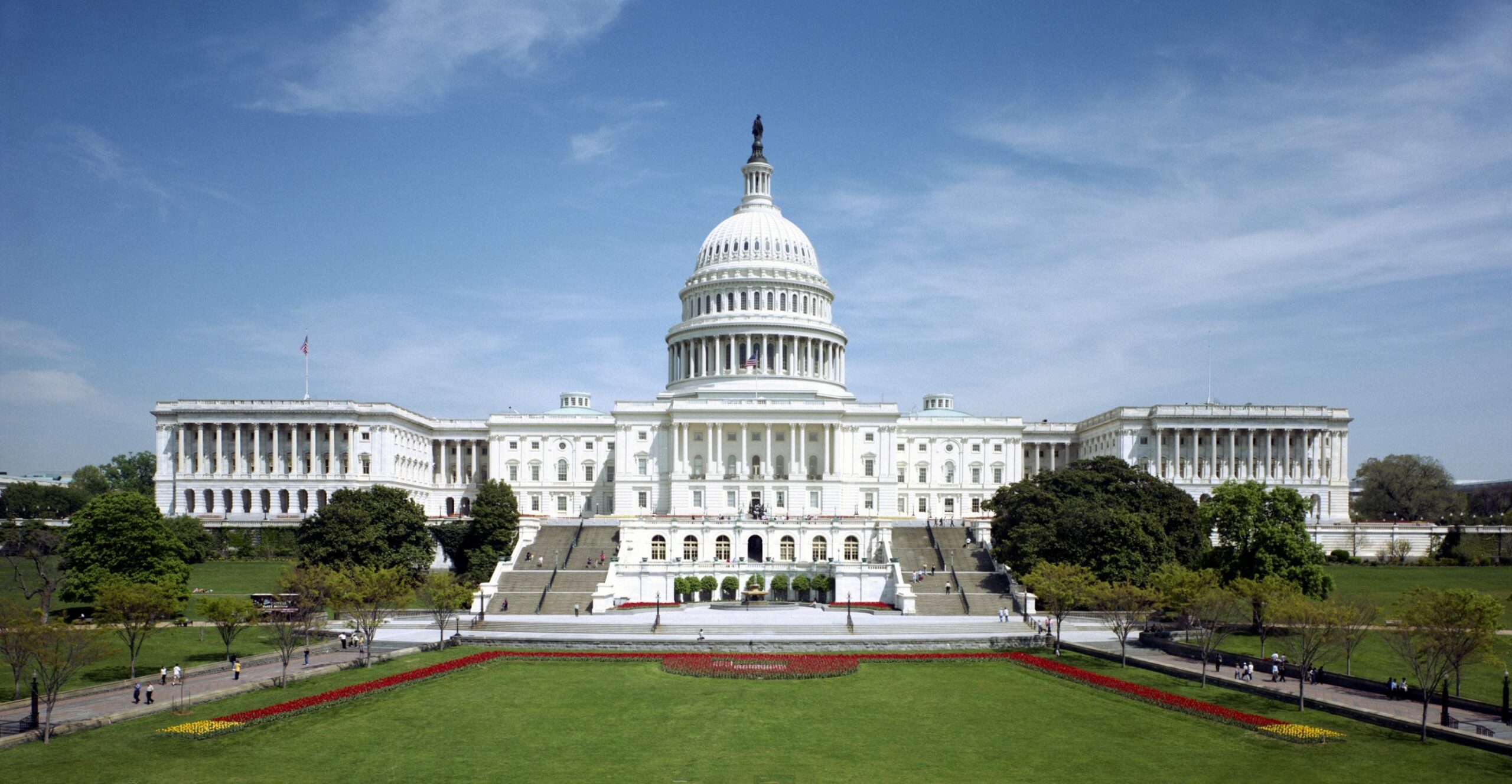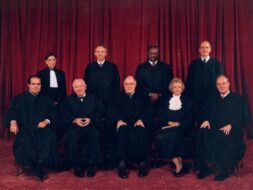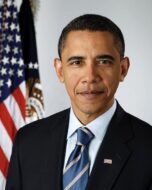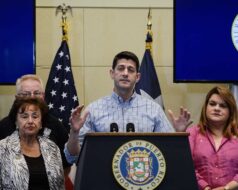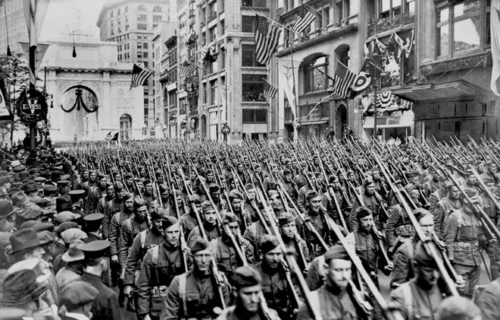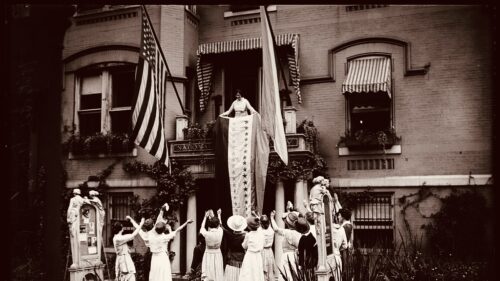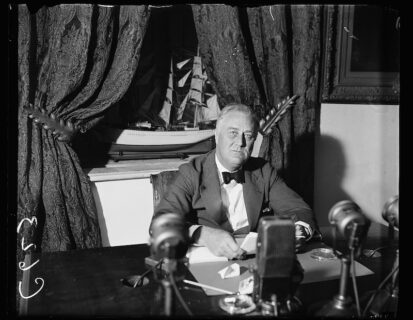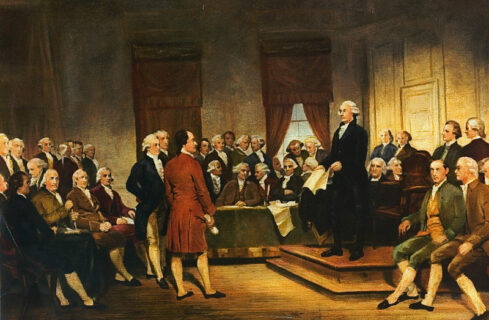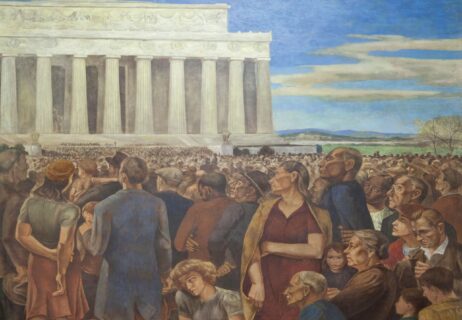
50 Core American Documents
This collection is an introduction to both American history and to the Core Documents project of Teaching American History. As an introduction to American history, it focuses on several key themes or ideas that have shaped our history, including equality and liberty, race and civil rights, religion and politics, America’s uniqueness and place in the world, the relationship between the states and the federal government, and the federal government and the daily lives of Americans. (Thematic Table of Contents, lists the documents according to theme.) It presents these themes and ideas as Americans thought about them when the United States was an agrarian republic, as it developed into an industrialized nation-state, and as it most recently struggled with the consequences of its success in creating a globalized economy and liberal international order that, to a remarkable degree, reflects the guiding principles of its own continental expansion (See The Northwest Ordinance). Those guiding principles were, in turn, formed from the central principle of all American history and politics—human equality—as expressed in the Declaration of Independence.
The Declaration is not placed among the fifty core documents in this collection for the simple reason that listing it as one among many documents does not do it justice. It, or rather the self-evident truth it enshrined—“all men are created equal”—is the transcendent cause of all the other documents in the collection. It appears in an appendix, as does the Constitution, not as an afterthought but as a sign of its singular importance. The opening words of the Constitution, “We the people,” derive their status from the Declaration. If Americans had not believed in equality, then the opening of the Constitution might have been written “We the white people,” or “We the rich,” or “We the poor,” or “We the people of British descent,” or “We the Protestant people.” It is true, of course, that some Americans have tried from time to time to read the opening of the Constitution in such partial ways, but the original plain and profound declaration of human equality has so far defied such readings and prevented them from gaining final authority. Paradoxically, perhaps, as the documents in this collection show, no idea in American history has been so hard for Americans to understand or has caused them so much trouble as the self-evident truth of human equality.
Documents other than those in this collection might have been chosen with equal justification to illuminate its themes. That does not diminish the importance of those that were chosen, however. It merely testifies to the rich supply of documents we may choose from. We have omitted documents dealing with foreign policy because that is rightfully subordinate to the issues the selected documents deal with. Including a few documents on foreign affairs seemed unnecessary since the Core Documents collection currently includes American Foreign Policy to 1899 and The Cold War, and will include American Foreign Policy since 1899.
As an introduction to the Core Documents Collection, this volume uses documents and editorial material taken from other volumes (see the note at the end of this introduction). As do the other volumes in the collection, this volume provides a general introduction and introductions to each document to provide historical context. Each document has been checked against an authoritative source to ensure accuracy and has been annotated to identify people, events, movements, or ideas that may be unfamiliar. In addition to the thematic table of contents already mentioned, every volume contains in an appendix one set of study questions on the document and another that refers to other documents in the collection, tying them together as the thematic table of contents does. Finally, all the volumes in the collection include an appendix with suggested further reading.
When completed, the Teaching American History documents collection will be a comprehensive and authoritative account of America’s story, told in the words of those who wrote it—America’s presidents, labor leaders, farmers, philosophers, industrialists, politicians, workers, explorers, religious leaders, judges, soldiers; its slaveholders and abolitionists; its expansionists and isolationists; its reformers and stand-patters; its strict and broad constructionists; its hard-eyed realists and visionary utopians—all united in their commitment to equality and liberty, yet all also divided often by their different understandings of these most fundamental American ideas. The documents are about all this—the still unfinished American experiment with self-government.
Equality and Liberty
- Virginia Declaration of Rights and Constitution
- Chief Justice William Cushing, Commonwealth v. Nathaniel Jennison
- Constitutional Convention, The Three-Fifths Clause
- Representative James Tallmadge, Speech to Congress
- President Andrew Jackson, Veto of the Bank Bill
- Abraham Lincoln, “The Perpetuation of Our Political Institutions” (Lyceum Address)
- Abraham Lincoln, Temperance Address
- Senator John C. Calhoun, Speech on the Oregon Bill
- Seneca Falls Resolutions
- Frederick Douglass, “What to the Slave Is the Fourth of July?”
- Abraham Lincoln, Speech on the Repeal of the Missouri Compromise
- Chief Justice Roger Taney, Justices John McLean and Benjamin Curtis, Dred Scott v. Sandford
- Alexander H. Stephens, The “Corner Stone” Speech
- The Farmers’ Movement
- W. G. Shell, The Shell Manifesto
- Eugene V. Debs, Liberty: Speech at Battery D, Chicago, on Release from Woodstock Jail
- Justices Henry Billings Brown and John Marshall Harlan, Plessy v. Ferguson
- W. T. B. Williams, “The Negro Exodus from the South,”
- A. C. Dixon, The Bible at the Center of the Modern University
- Chief Justice Earl Warren, Brown v. Board of Education of Topeka
- F. L. Shuttlesworth and N. H. Smith, Birmingham Manifesto
- President Lyndon B. Johnson, “To Fulfill These Rights,” Commencement Address at Howard University
- Representative Shirley Chisholm, “For the Equal Rights Amendment,”
- Justice Sandra Day O’Connor and Justice Clarence Thomas, Grutter v. Bollinger
Equality and Opportunity
- Benjamin Franklin, Autobiography
- President Thomas Jefferson, First Inaugural Address
- President Andrew Jackson, Veto of the Bank Bill
- John L. O’Sullivan, “The Great Nation of Futurity,”
- The Farmers’ Movement
- Theodore Roosevelt, “The New Nationalism,”
- W. T. B. Williams, “The Negro Exodus from the South,”
- Ronald Reagan, “A Time for Choosing,”
- Republican National Committee, Contract with America
- President Barack Obama, Remarks on the Economy
- Representative Paul Ryan, Acceptance Speech
Slavery
- Chief Justice William Cushing, Commonwealth v. Nathaniel Jennison
- Constitutional Convention, The Three-Fifths Clause
- The Northwest Ordinance
- Representative James Tallmadge, Speech to Congress
- Abraham Lincoln, Temperance Address
- Senator John C. Calhoun, Speech on the Oregon Bill
- Frederick Douglass, “What to the Slave Is the Fourth of July?”
- Abraham Lincoln, Speech on the Repeal of the Missouri Compromise
- Chief Justice Roger Taney, Justices John McLean and Benjamin Curtis, Dred Scott v. Sandford
- Alexander H. Stephens, “Corner Stone” Speech
- President Abraham Lincoln, Second Inaugural Address
Race and Civil Rights
- Chief Justice William Cushing, Commonwealth v. Nathaniel Jennison
- W. G. Shell, The Shell Manifesto
- Justices Henry Billings Brown and John Marshall Harlan, Plessy v. Ferguson
- W. T. B. Williams, “The Negro Exodus from the South,”
- Chief Justice Earl Warren, Brown v. Board of Education of Topeka
- F. L. Shuttlesworth and N. H. Smith, Birmingham Manifesto
- President Lyndon B. Johnson, “To Fulfill These Rights,” Commencement Address at Howard University
- Jesse Jackson, “The Rainbow Coalition,” Speech to the Democratic National Convention
- Justice Sandra Day O’Connor and Justice Clarence Thomas, Grutter v. Bollinger
Women’s Rights
Native Americans
- John Ross, Address to the People of the United States, by the General Council of the Cherokee Nation
- Plenty Horses Kills Lieutenant Casey
Religion and Politics
- James Madison, Memorial and Remonstrance
- The Northwest Ordinance
- Secretary of State John Quincy Adams, An Address Celebrating the Declaration of Independence
- Edward Beecher, “The Nature, Importance, and Means of Eminent Holiness throughout the Church,”
- Abraham Lincoln, Temperance Address
- President Abraham Lincoln, Second Inaugural Address
- A. C. Dixon, “The Bible at the Center of the Modern University,”
- Harry Emerson Fosdick, “Shall the Fundamentalists Win?”
Rights
- Virginia Declaration of Rights and Constitution
- President George Washington, Letter to the Hebrew Congregation at Newport
- President Thomas Jefferson, First Inaugural Address
- Seneca Falls Resolutions
- Woodrow Wilson, “What Is Progress?”
- Franklin D. Roosevelt, Commonwealth Club Address
- President Harry Truman, Veto of the Internal Security Act
- President Lyndon B. Johnson, “To Fulfill These Rights,” Commencement Address at Howard University
- Representative Shirley Chisholm, “For the Equal Rights Amendment,”
American Exceptionalism
- Benjamin Franklin, Autobiography
- The Northwest Ordinance
- President George Washington, Letter to the Hebrew Congregation at Newport
- President Thomas Jefferson, First Inaugural Address
- Secretary of State John Quincy Adams, An Address Celebrating the Declaration of Independence
- Edward Beecher, “The Nature, Importance, and Means of Eminent Holiness throughout the Church,”
- John L. O’Sullivan, “The Great Nation of Futurity,”
- President Barack Obama, Remarks on the Economy
- Representative Paul Ryan, Acceptance Speech
Federalism
- Brutus I
- Publius (James Madison), Federalist 10
- President Thomas Jefferson, First Inaugural Address
- President Andrew Jackson, Veto of the Bank Bill
- Theodore Roosevelt, “The New Nationalism,”
- Franklin D. Roosevelt, Commonwealth Club Address
- President Herbert Hoover, The Consequences of the Proposed “New Deal,”
- Justice Robert H. Jackson, Wickard v. Filburn
Government and the Economy
- Publius (James Madison), Federalist 10
- President Thomas Jefferson, First Inaugural Address
- President Andrew Jackson, Veto of the Bank Bill
- Theodore Roosevelt, “The New Nationalism,”
- Franklin D. Roosevelt, Commonwealth Club Address
- President Herbert Hoover, The Consequences of the Proposed “New Deal,”
- Justice Robert H. Jackson, Wickard v. Filburn
- Ronald Reagan, “A Time for Choosing,”
- Republican National Committee, Contract with America
- President Barack Obama, Remarks on the Economy
- Representative Paul Ryan, Acceptance Speech
Benjamin Franklin, Autobiography, 1771–1790
- If Franklin was the “First American,” what does his Autobiography tell us about being American? Why did Franklin include anecdotes in his Autobiography like those in the excerpt? What do they tell us about Franklin’s view of the world? Why do you think that Franklin did not include courage in his list of virtues? How would you describe Franklin’s attitude toward religion?
- How do the virtues that Franklin listed and described compare to those listed in the Virginia Declaration of Rights? Madison’s Memorial and Remonstrance claimed that “it is the duty of every man to render to the Creator such homage, and such only, as he believes to be acceptable to him. This duty is precedent, both in order of time and in degree of obligation, to the claims of civil society.” Would Franklin have agreed with this statement?
Virginia Declaration of Rights and Constitution, June 12, 1776
- According to the Declaration of Rights, why is all power invested in the people? What is the purpose of government? Why do people have a right to change their government? What is the connection between articles 1 and 4 in the Declaration? What is the connection between articles 1 and 16? If everyone is by nature free and independent, does that require that everyone be entitled to the free exercise of religion?
- How do the virtues listed in the Declaration of Rights compare to those listed and described in Franklin’s Autobiography? Do the rights and principles of government articulated in the Virginia Declaration of Rights help decide the argument between Federalists and Antifederalists? Why do both Article 4 of the Declaration and The Veto of the Bank Bill criticize privilege?
Chief Justice William Cushing, Commonwealth v. Nathaniel Jennison, April 1783
- Why did Justice Cushing find slavery to be inconsistent with the Massachusetts Constitution? If the facts of the case led Cushing to conclude that Quock Walker’s owners had freed him before Nathaniel Jennison imprisoned him, did he need to mention the Massachusetts Constitution? Why do you think he did so?
- What do the argument and decision in this case suggest about the claims made by Chief Justice Taney in Dred Scott v. Sandford?
James Madison, Memorial and Remonstrance, June 20, 1785
- How did Madison support his claim that the duty we owe to the Creator is “precedent both in order of time and in degree of obligation, to the claims of civil society”? Which arguments do you find stronger and more important, those derived from claims about the duty we owe the Creator or the practical arguments that point out the problems that a law requiring taxes to support churches would cause the state of Virginia?
- If it is true, as The Northwest Ordinance claims, that religion is necessary “to good government and the happiness of mankind,” should the government not be able to do something to encourage and support religion?
Constitutional Convention, The Three-Fifths Clause, June–August 1787
- How would you describe the different ways the delegates talked about slavery? Is it surprising that the South Carolina delegates wanted to count each slave as “three fifths” of a person? Did they offer any logical grounds for this position? Why was the three-fifths clause embedded in a discussion about the “scheme of representation” appropriate for a federal republic?
- Does the argument in Commonwealth v. Nathaniel Jennison or the prohibition of slavery in The Northwest Ordinance change the way we understand the argument about slavery in the debate over the three-fifths clause? Should it? Does Frederick Douglass’ speech on the meaning of the Fourth of July change how we look at the three-fifths debate?
The Northwest Ordinance, July 13, 1787
- Why did Congress agree to admit new states on equal terms with the original thirteen members of the Union, and not as colonies or territories with limited rights? What constitutes republican government, and who decides on its meaning? Should the western territories have been allowed to form a separate nation or nation, as some advocated? Why do you think antislavery congressmen supported the inclusion of a fugitive slave clause?
- During the sectional conflict, what role did the Northwest Ordinance play in arguments about whether slavery should be allowed in the territories (See James Tallmadge Jr., John C. Calhoun, and Abraham Lincoln)?
- Why did Brutus believe that a republic as large as the one proposed by the Constitution would lead to tyranny?
- Who has the better argument, Publius or Brutus? What do you think is the most important difference between them? Did they both understand the principles and rights articulated in the Virginia Declaration of Rights and the Declaration of Independence?
Publius (James Madison), Federalist 10, November 22, 1787
- How did Madison make his argument that an extended republic would help preserve freedom? What did Madison mean when he spoke of an aggregate good? According to Madison, how did the system of representation in the new constitution serve that good?
- Who has the better argument, Publius or Brutus? What do you think is the most important difference between them? Did they both understand the principles and rights articulated in the Virginia Declaration of Rights and the Declaration of Independence?
President George Washington, Letter to the Hebrew Congregation at Newport, August 18, 1790
- What is the difference between religious tolerance and religious liberty? Is religious liberty required when government is based on human equality?
- Is religious liberty compatible with or does it pose problems for the providential account of American history given in An Address Celebrating the Fourth of July? Is it compatible with Lincoln’s account of the Civil War in his Second Inaugural Address?
President Thomas Jefferson, First Inaugural Address, March 4, 1801
- What did Jefferson mean when he distinguished between political opinions and principles? How did he use this distinction to unite Americans? What did Jefferson mean when he said “that though the will of the majority is in all cases to prevail, that will to be rightful must be reasonable”?
- In what ways is Jefferson’s Inaugural Address similar to Lincoln’s Second Inaugural? In what ways is it different? After reading his Inaugural, do you think Jefferson was more of a Federalist or Antifederalist? Are there both Federalist and Antifederalist elements in the speech?
Representative James Tallmadge, Speech to Congress, February 15, 1819
- How did Tallmadge understand slavery, and what were his views on the possibility of a sectional crisis, or even a civil war, over the status of slavery in the territories? What legal and constitutional arguments did Tallmadge make in defense of prohibiting slavery in the territories?
- How do Tallmadge’s and Lincoln’s arguments compare? Did they see the same dangers in the slavery question? Did they share the same views about the legal status of slavery? How did they propose to deal with the slavery issue? How do their views compare to those of Calhoun.
- What connection did Adams see between the Reformation and the American Revolution? How did Adams explain the development of free government? Why did he say that the government of the United States was the first legitimate government?
- Are there similarities in the views of John O’Sullivan and Adams? What place did they see the United States and the American people having in human history? How would you say their views differ?
- What kind of arguments did Ross use to appeal to the American people? Do you find his arguments persuasive? Which argument do you think is the strongest?
- Do you agree that this document suggests that the United States did not always live up to the statements in the Northwest Ordinance (Article 3) describing how the United States would deal with Native Americans? If so, why do you think that happened?
President Andrew Jackson, Veto of the Bank Bill, July 10, 1832
- Why did Jackson oppose the privileges that the Bank Bill granted to the bank’s shareholders? Why did he oppose the monopoly created by the bill? Should Jackson have concluded that the benefits the bank created for the government outweighed the harm he thought it caused? Why did Jackson think that the Supreme Court does not have the sole power to decide what is constitutional? Do you agree with his argument? How do the rights of the states enter into Jackson’s arguments about the Bank bill? Why did Jackson argue that it is important to respect the rights of the states?
- In his explanation of his veto of the Bank Bill, did Jackson seem more like Brutus or Publius? Why?
Edward Beecher, “The Nature, Importance, and Means of Eminent Holiness throughout the Church,” 1835
- What is holiness, according to Beecher? How was the holiness movement connected to the “regeneration of the world”? What did Beecher mean when he spoke of the regeneration of the world? How did the holiness and reform movements view man, God, and nature?
- What are the differences between the religion that Beecher preached and the religion that Franklin had in mind? In the Temperance Address, what was Lincoln’s concern with the kind of religion that Beecher preached?
Abraham Lincoln, “The Perpetuation of Our Political Institutions” (Lyceum Address), January 27, 1838
- What dangers did Lincoln see for the perpetuation of America’s political institutions? How are they related? Do these dangers arise only because of our institutions or are they always present in political life? What circumstances contribute to them? What did Lincoln mean at the end of his speech when he appealed to “reason, cold, calculating, unimpassioned reason”?
- Compare Lincoln’s concerns and argument with those of Beecher and O’Sullivan. Are they the same? How would you describe the differences? Do you think that Lincoln would see Beecher and O’Sullivan as allies in the effort to perpetuate America’s political institutions?
John L. O’Sullivan, “The Great Nation of Futurity,” November 1839
- According to O’Sullivan, what makes America great and unique? Why is it destined to be the nation of the future?
- Based on what Lincoln said in The Perpetuation of Our Political Institutions Address before the Young Men’s Lyceum of Springfield, Illinois and The Temperance Address, do you think he would have agreed with O’Sullivan? Did O’Sullivan talk about equality the same way that Lincoln did in his Speech on the Repeal of the Missouri Compromise? How did O’Sullivan’s views about America and its role in history differ from those of John Quincy Adams?
Abraham Lincoln, Temperance Address, February 22, 1842
- How did Lincoln connect slavery and drunkenness in the speech? Do you think that Lincoln thought that the “Reign of Reason” would ever come? The temperance movement was meant to free people from drink, but did temperance itself pose any problems for freedom? Did Lincoln see a political problem with the Temperance movement? What problem did he see? Did he see a problem with religion’s role in a political order based on human equality? Did he see problems with only a certain kind of religion? What characteristics of religion make it a problem for a government based on human equality?
- How do you think that Lincoln would respond to Edward Beecher’s sermon on holiness? Do you think that Lincoln would find O’Sullivan “intemperate”? Why? Do you think that he would find Lyndon Johnson’s proposals in “To Fulfill These Rights” “temperate”? In considering which characteristics of religion might be a problem for a government based on equality, consider the Birmingham Manifesto and Contract with America.
Senator John C. Calhoun, Speech on the Oregon Bill, June 27, 1848
- According to Calhoun, what will a future historian of the decline and fall of the American Union think was the cause of its failure? Why did Calhoun reject the principles of natural liberty and natural equality? What did Calhoun mean, exactly, when he said that liberty is a “reward” or a “prize to be won”?
- How do you think that Jefferson would respond to Calhoun’s attack on the claim in the Declaration of Independence that all men are created equal? How did Calhoun’s understanding of liberty depart from that of the American Founders? If Calhoun rejected the principles of natural equality and liberty, should he also have rejected the idea of freedom of religion? Consider James Madison’s argument in Memorial and Remonstrance.
Seneca Falls Resolutions, July 19–20, 1848
- Why do you think some delegates at the Women’s Rights Convention thought that demanding female suffrage in the Resolutions would “make the whole movement ridiculous”? Why did advocating for women in the pulpit and “in the various trades, professions, and commerce” not raise the same objection?
- Compare the Seneca Falls Resolutions and “Mandate for Reform.” What has changed and what remains the same as far as women’s rights and women’s role in American life?
Frederick Douglass, “What to the Slave Is the Fourth of July?” July 5, 1852
- Why would Douglass want to deliver this speech on July fifth instead of the fourth? What are the meaning and significance of the Fourth of July from the slave’s point of view? Why did Douglass call slavery a violation of the principles of the Declaration of Independence, and why did he call the Founders “statesmen, patriots and heroes”? Why did Douglass believe that the Constitution is an antislavery document?
- In his views on slavery and the Constitution, did Douglass differ from Abraham Lincoln? Does The Three-Fifths Compromise debate confirm or contradict Douglass’ claims about the Constitution?
Abraham Lincoln, Speech on the Repeal of the Missouri Compromise, October 16, 1854
- Why did Lincoln believe that Stephen Douglas’ policy of indifference to whether people of a territory permitted slavery or not was equivalent to “covert real zeal for the spread of slavery”? What was “the sheet anchor” of American republicanism, according to Lincoln, and how did the Kansas-Nebraska Act of 1854 violate it? What did Lincoln mean when he said that the Union must be made “worthy of the saving”?
- Compare the arguments of Calhoun and Lincoln on the meaning of equality and the status of slavery. What are the most important points of their disagreement? Did Lincoln, Lyndon Johnson, and the justices of the Supreme Court (Dred Scott v. Sandford, Brown V. Board of Education, Grutter v. Bollinger) have the same understanding of equality?
- What were the main issues in Dred Scott, and what were Chief Justice Taney’s main arguments for deciding them in the way that he did? On what grounds and with reference to which historical facts did Justices Curtis and McLean dissent from the Court’s ruling?
- How would Taney reply to Abraham Lincoln’s arguments about the meaning of the Declaration and the constitutional status of slaves and free African Americans? Considering Commonwealth v. Nathaniel Jennison, The Three-Fifths Clause debate, and The Northwest Ordinance, was it Taney or McLean who provided the more accurate account of the opinions of those at the Constitutional Convention?
Alexander H. Stephens, The “Corner Stone” Speech, March 21, 1861
- Why did Stephens think the Constitution of 1787 needed to be improved? How did the Confederate constitution improve on it? Did Stephens deny that blacks are human? To what evidence did he appeal to prove their inequality? Why did he not contradict the Declaration of Independence by saying that it was self-evident that blacks were not equal?
- Lincoln spoke of equality in his speech on the repeal of the Missouri Compromise. How do his views of equality and the equality of African Americans compare to those of Stephens? Stephens argued that there was a scientific basis for his views of African Americans. How would A. C. Dixon respond to his arguments? How would Dixon respond to Stephens’ use of the Bible to defend slavery? How would Lincoln respond to these different uses of the Bible? Why did Stephens contradict the argument of Taney about how the founding generation and the Constitution looked at slavery.
President Abraham Lincoln, Second Inaugural Address, March 4, 1865
- How did Lincoln explain the Civil War? Who was at fault?
- Are Lincoln’s views of God’s relation to humans the same in the Temperance Address and the Second Inaugural? Is there a similarity in his view of southerners in the Second Inaugural and his view of drunkards in the Temperance Address? Is this the same view or attitude expressed toward sin in Beecher’s sermon on holiness? Based on the Second Inaugural Address, how do you think Lincoln would respond to Alexander Stephens’ and A. C. Dixon’s interpretations of the Bible with regard to slavery?
The Farmers’ Movement, 1873–1874
- Based on the excerpts of the Kansas Association and the Grange, what differences do you see between the two organizations? Why did the Grange highlight the point that “[i]n our noble Order there is no communism, no agrarianism”? Why were the farmers concerned with tariffs? What did their debate on the resolution show to be their attitude toward tariffs?
- Compare the final lines of this document with the final lines of the Declaration of Independence. What similarities do you see? What are the similarities between the last lines of this document and article 15 in the Virginia Declaration of Rights and Constitution? Why do you think they exist? Are the views of the farmers on the role of federal government similar to Brutus’ or Publius’, to Franklin Roosevelt’s or Herbert Hoover’s? Would the farmers have been in favor of the Supreme Court’s decision in Wickard v. Filburn?
W. G. Shell, The Shell Manifesto, January 23, 1890
- What do you think Shell meant by “real Republican government”? Why do you think the Manifesto was critical of lynching? Why did Shell put so much emphasis on education?
- What are the similarities in arguments and proposals between the Manifesto and Documents Autobiography, Virginia Declaration of Rights and Constitution, First Inaugural Address, Veto of the Bank Bill, The Farmers’ Movement, Liberty: Speech at Battery D, Chicago, on Release from Woodstock Jail, The New Nationalism, What Is Progress?, and Campaign Address on Progressive Government at the Commonwealth Club?
Plenty Horses Kills Lieutenant Casey, January 7, 1891
- How would you describe the attitude of McGillycuddy toward the Indians? Why did he quote Red Cloud and Little Wound? Why did he think the fighting and Wounded Knee occurred? How did Plenty Horses explain why he killed Lieutenant Casey?
- Compare this document to John Ross’ appeal to the American people. What similarities do you see?
- Do you agree with Debs that he was denied his rights? Was there a usurpation of rights? Is his criticism of corporations similar to Andrew Jackson’s? Did the new industrial economy require new thinking about rights?
- Are there similarities in the unions’, women’s, and African Americans’ struggle for rights (See Seneca Falls Resolutions, What to the Slave Is the Fourth of July?, Birmingham Manifesto, Mandate for Reform)? What role have the courts and legislation played in that struggle (See Brown v. Board of Education, and Grutter v. Bollinger)? Why did both Eugene Debs and F. L. Shuttlesworth and N. H. Smith appeal to the Declaration of Independence? What is the connection between the Declaration and the rights claims made by workers, women, and African Americans? Could those claims be made without the Declaration? What do you think Theodore Roosevelt, Woodrow Wilson, and Franklin Roosevelt would have said about the Debs case?
Justice Henry Billings Brown and Justice John Marshall Harlan, Plessy v. Ferguson, May 18, 1896
- Why did Justice Brown decide that the Louisiana statute in question did not violate the Thirteenth and Fourteenth Amendments? Why did Brown make a distinction between civil or political equality and social equality? Why, according to Harlan, do the Thirteenth and Fourteenth Amendments make the Constitution “color-blind”?
- Was Justice Harlan right to compare the Court’s decision in this case to the Dred Scott decision?
Theodore Roosevelt, “The New Nationalism,” August 31, 1910
- How would you describe Roosevelt’s “New Nationalism”? What were its purposes? What were its means?
- Do Roosevelt’s views have more in common with those of Barack Obama or Paul Ryan? How do his views compare with those of Franklin Roosevelt and Ronald Reagan? Do you see similarities in Andrew Jackson’s criticism of monopolies and Roosevelt’s criticisms of special interest?
Woodrow Wilson, “What Is Progress?” 1913
- Explain Wilson’s idea of the “Newtonian” and “Darwinian” worldviews. How did he use this distinction to critique the American Founders’ understanding of the Constitution? What did Wilson mean when he said that the Declaration of Independence is a practical rather than a theoretical document? Why did he want to convince us of this?
- How would Wilson respond to A. C. Dixon, who was skeptical of progress? How would Dixon criticize Wilson? Did Wilson and Fosdick understand progress in the same way?
W. T. B. Williams, “The Negro Exodus from the South,” 1919
- Of the many causes that Williams cited for African Americans leaving the South, which do you think Williams believed most important? How would you characterize his view of the migration? Did he see it causing any problems?
- How is Williams’ report on conditions in the South a commentary on the Court’s opinion in Plessy v. Ferguson?
A. C. Dixon, “The Bible at the Center of the Modern University,” June 1920
- Why did Dixon insist on the perfection of creation and the priority of the mature product over the seed? Why did evolution pose a challenge to the account of the creation of the world in Genesis? How did Dixon connect the perfection of creation to his critique of the superman and the idea that might makes right?
- Did Dixon and Roosevelt invoke Lincoln in the same way and for the same purpose? Based on what Lincoln said in the Lyceum Address, the Temperance Address, and the Second Inaugural, do you think that Dixon and Roosevelt understood Lincoln? Did one understand him better than the other? Dixon talked about protecting the weak, as did Paul Ryan. Why did both men mention this?
Harry Emerson Fosdick, “Shall the Fundamentalists Win?” June 10, 1922
- What was Fosdick’s attitude toward science? Toward the Bible? What did Fosdick mean by progressive revelation? Is there a connection between progressive revelation and evolution? What was the greater authority for Fosdick, the Bible or science? Why was tolerance so important to Fosdick? Was tolerance connected to what he considered progress?
- What would Fosdick say about A. C. Dixon’s claims about the strong mistreating the weak? Would he object? If so, on what basis? Could revelation ever progress to the point that Christianity would teach that the strong had the right to mistreat the weak?
- Why, according to Roosevelt, was individualism appropriate in the late eighteenth and nineteenth centuries, but not in the twentieth? What did he mean when he claimed that “the day of enlightened administration has come”? Who or what did Roosevelt blame for the Depression?
- How does Roosevelt’s understanding of rights and the principles of American government compare with those of the Founders (See Autobiography, Virginia Declaration of Rights and Constitution, Memorial and Remonstrance, Brutus I, Federalist 10, First Inaugural Address)? In particular, how does Roosevelt’s view of the role of government in the economy compare with the views found in these older documents? How does his analysis of the recent past differ from that put forward by Hoover?
President Herbert Hoover, The Consequences of the Proposed “New Deal,” October 31, 1932
- What did Hoover regard as the primary cause of the Depression? Why did he believe it more important to focus on the past thirty years rather than on the last three? Why did he believe that Roosevelt’s New Deal would be dangerous for the country?
- How does Hoover’s account of the origins of the Depression compare with that of Roosevelt, as seen in Campaign Address on Progressive Government at the Commonwealth Club? Was Hoover accurate in what he said about the Founding, as represented in Autobiography, Virginia Declaration of Rights and Constitution, Memorial and Remonstrance, Brutus I, Federalist 10, First Inaugural Address?
Justice Robert H. Jackson, Wickard v. Filburn, November 9, 1942
- In the Court’s view, why did it not matter whether the local production to be regulated by Congress was part of the “flow of commerce”? Based on this decision, are there any local economic activities that are beyond the scope of Congress’ power? If so, what would they be?
- Compare the Court’s reasoning in this case with the arguments of Brutus and Publius. Would either or both agree with the Court’s argument? Does that matter; or when evaluating the Court’s ruling should we simply look at current circumstances and the consequences of what the Court decides?
President Harry S. Truman, Veto of the Internal Security Bill, September 22, 1950
- What reasons did Truman give for vetoing the Security Bill? Which of these reasons do you think was most important to him? What reason did he give for being concerned about freedom of expression? What is the connection between free expression and progress? Based on Truman’s arguments, do you think he would have ever thought there was a time when it was acceptable to limit freedom of opinion?
- Truman mentioned the Alien and Sedition Acts. Was his attitude toward the freedom of political views the same as that expressed by Thomas Jefferson in his First Inaugural Address? Is there a connection between the defense of tolerance made by Harry Emerson Fosdick and Truman’s concern with free expression?
Chief Justice Earl Warren, Brown v. Board of Education of Topeka, May 17, 1954
- According to the Court, why did “separate but equal” educational facilities inherently violate “equal protection of the laws”? Would the same reasoning apply to other racially segregated facilities?
- Why do you think the Court did not simply adopt John Marshall Harlan’s dissent in Plessy v. Ferguson, which declared that all racially segregated public facilities violate equal protection of the laws because “our Constitution is color-blind, and neither knows nor tolerates classes among citizens”? Why did the Court use evidence from psychological studies?
F. L. Shuttlesworth and N. H. Smith, Birmingham Manifesto, April 3, 1963
- Why did the Birmingham Manifesto quote the Declaration of Independence and the Pledge of Allegiance? In practical terms, what would the “beloved community” have meant in Birmingham?
- How do the grievances explained in the Manifesto compare with those that W.T. B. Williams found in the South in 1919? Does the spirit of the Manifesto have anything in common with Lincoln’s Second Inaugural? Based on what Lincoln argued in the Lyceum Address, would he approve of the “direct action” that the Manifesto threatened?
Ronald Reagan, “A Time for Choosing,” October 27, 1964
- How did Reagan explain his opposition to the policies of the U.S. government? Of the many objections he made, which do you think were most important to him? What did Reagan see as the proper role of government?
- Do you see any similarities in the opinions of Reagan and A. C. Dixon? Between Reagan and Herbert Hoover? Do you think Reagan would have agreed with the Supreme Court’s decision in Wickard v. Filburn? As a younger man, Reagan was a Democrat and a supporter of the New Deal. He became a Republican in 1962. How did he explain his change of political views?
- Why did Johnson think that equality of opportunity was not enough? What did he mean by “equality as a result”? How could this be brought about? Johnson titled his speech “To Fulfill These Rights,” but he also spoke of justice as fulfilling fair expectations. Are rights and expectations the same things? Who decides if the expectations that justice requires be fulfilled are fair or not?
- How does Johnson’s statement of the civil rights problem and its solutions differ from Frederick Douglass’, F. L. Shuttlesworth’s and N. H. Smith’s, or the Supreme Court’s?
- Where did Chisholm place women in the fight for equal rights? How did their progress compare with that of other groups striving for equality? How did Chisholm challenge anti-ERA arguments by juxtaposing the ERA with civil rights legislation? What are some of the many “ambiguities and inconsistencies” of our legal system the Equal Rights Amendment would clarify?
- Based on discussions in the Constitutional Convention, the provisions of the Northwest Ordinance, Abraham Lincoln’s analysis, and the arguments in the Dred Scott case, does Chisholm appear to have been correct to claim that “the Constitution . . .was designed to protect the rights of white, male citizens”? Was it designed to protect only the rights of males? Is there any reason why the Fourteenth Amendment to the Constitution would not protect the rights of women? Why do you think some women thought it was unrealistic to expect this to happen through the courts? Compare Chisholm’s arguments and account of the condition of women with those given in the Seneca Falls Resolutions.
McGovern-Fraser Commission, “Mandate for Reform,” September 22, 1971
- Why did the report claim that “popular control over the nominating process has been a principle of the Democratic Party since the birth of the national convention 140 years ago,” when the bulk of the report showed this not to be true? Why did the report criticize majority rule? Why would a national primary be the most democratic means of selecting a candidate? If it were the most democratic means, does that mean it would be the best means? Why was the report critical of majority rule?
- How does “Mandate for Reform” differ in its view of parties from Federalist 10? Would Publius think that the modern Democratic or Republican party was a faction? Does “Mandate for Reform” take the same view of equality as Lyndon Johnson did in “To Fulfill These Rights“? Does “Mandate for Reform” use the same measure of equality as Johnson did? That is, does it focus on equal access or equal results? How does it judge what an equal result is?
Jesse Jackson, “The Rainbow Coalition,” Speech to the Democratic National Convention, July 18, 1984
- What did Jackson see as the common bond shared by the groups composing his “Rainbow Coalition”? Was the coalition he envisioned defined more by what it supported or what it opposed? To what extent did Jackson’s conception of his party as a coalition of identity groups foretell the course of the Democratic Party’s development in the twenty-first century? To what extent is it indicative of the evolution of civil rights advocacy into multiculturalism? How well could Jackson’s “Rainbow” idea promote his stated objective of national unity?
- Does the way that Jackson talked about civil rights and race differ from the way that Frederick Douglass and Shuttlesworth and Smith talked about these issues? If you think there are differences, how would you describe them?
Republican National Committee, Contract with America, September 27, 1994
- Why and how would the changes proposed by the contract affect the ability of senior leadership and committee chairs to control their party and committee members in the House? How would you describe the Republican agenda as presented in the contract?
- What similarities and differences do you see between the contract and the political programs outlined in The Farmers’ Movement, The Shell Manifesto, The New Nationalism, What Is Progress?, Campaign Address on Progressive Government at the Commonwealth Club, A Time for Choosing, Remarks on the Economy Osawatomie, Kansas, and Acceptance Speech? Do you see any similarities in the objectives of the McGovern-Fraser proposals and the Contract with America? Any differences?
Justice Sandra Day O’Connor and Justice Clarence Thomas, Grutter v. Bollinger, June 23, 2003
- Justice O’Connor’s opinion for the Court majority in this case held that the University of Michigan Law School had a compelling interest—that is, an interest that was necessary or essential rather than discretionary—in maintaining a diverse student body. Why? Why in particular would racial or ethnic diversity be a compelling interest? If such diversity was a compelling interest, why did the majority insist the use of race or ethnicity classifications in admissions should be limited in duration? Why did the Court reject outright race balancing as a state policy? According to Justice Thomas, in dissent, in what ways do racial preference programs harm their intended beneficiaries?
- In Grutter and Brown v. Board of Education how did the Court weigh these two competing objectives: (1) access to public educational institutions must be free from racial or ethnic discrimination, and (2) public educational institutions must be integrated by including representatives of various racial or ethnic groups? Is the employment of racial or ethnic classifications in public policy compatible in principle with the integrationist vision of the Birmingham Manifesto?
President Barack Obama, Remarks on the Economy, Osawatomie, Kansas, December 6, 2011
- What did President Obama see as the most important issues facing the country? How did he propose to deal with them? What did he see as the role of the government in dealing with America’s problems? When Obama spoke about investments, what was he talking about? Why did a Democratic president give a speech at the same place where a famous former Republican president had spoken?
- Obama mentioned the New Nationalism speech of Theodore Roosevelt, also given at Osawatomie, Kansas. Was Obama making the same arguments as Roosevelt did? What differences, if any, do you see? Obama spoke of an American tradition of two hundred years. Was Obama making the same arguments that the Founders made (See Autobiography, Virginia Declaration of Rights and Constitution, Federalist 10, First Inaugural Address)? How do Obama’s views compare with Andrew Jackson’s?
Representative Paul Ryan, Acceptance Speech, August 29, 2012
- What did Ryan see as the most important issues facing the country? How did he propose to deal with them? What did he see as the role of the government in dealing with America’s problems? Why did Ryan mention the American Founding?
- Compare Ryan’s speech with Ronald Reagan’s. In what ways are they similar? Are there differences? How do Ryan’s views compare with those of Barack Obama? Ryan invoked the American Founding. Was he making the same arguments that the Founders made (See Autobiography, Virginia Declaration of Rights and Constitution, Federalist 10, First Inaugural Address)? How do Ryan’s views compare with Andrew Jackson’s? Ryan talked about protecting the weak, as did A. C. Dixon. Why did both men mention this?
Ahlstrom, Sydney E. A Religious History of the American People. New Haven: Yale University Press, 1972; 2nd edition, with a chapter by David Hall, 2004.
Beeman, Richard. Plain, Honest Men: The Making of the American Constitution. New York: Random House, 2009.
Cott, Nancy F., ed. No Small Courage: A History of Women in the United States. New York: Oxford University Press, 2000.
Croly, Herbert. The Promise of American Life. 1909; Princeton: Princeton University Press, 2014.
Dangerfield, George. The Era of Good Feelings. New York: Harcourt, Brace, 1952.
Fairclough, Adam. Better Day Coming: Blacks and Equality, 1890–2000. New York: Penguin Books, 2001.
Foner, Eric. The Second Founding: How the Civil War and Reconstruction Remade the Constitution. New York: W. W. Norton, 2019.
Freehling, William F. The Road to Disunion. Vol. 1: Secessionists at Bay, 1776– 1854. New York: Oxford University Press, 1990.
________. The Road to Disunion. Vol. 2: Secessionists Triumphant, 1854 1861. New York: Oxford University Press, 2007.
Jaffa, Harry V. Crisis of the House Divided: An Interpretation of the Issues in the Lincoln-Douglas Debates. 1959; Chicago: University of Chicago Press, 2009
Katznelson, Ira. Fear Itself: The New Deal and the Origins of Our Time. New York: Liveright, 2014.
Keith, LeeAnna. The Colfax Massacre: The Untold Story of Black Power, White Terror, and the Death of Reconstruction. New York: Oxford University Press, 2008.
Kolchin, Peter. American Slavery, 1619–1877. 1993; New York: Hill and Wang, 2003.
Landy, Marc, and Sidney M. Milkis. Presidential Greatness. Lawrence: University Press of Kansas, 2000.
Lawrence, John A. The Class of ‘74: Congress after Watergate and the Roots of Partisanship. Baltimore: Johns Hopkins University Press, 2018.
Lemann, Nicholas. The Promised Land: The Great Black Migration and How It Changed America. New York: Vintage Books, 1991.
Lloyd, Gordon, ed. Debates in the Federal Convention of 1787 by James Madison, a Member. Ashland, Ohio: Ashbrook Center, 2014.
Maier, Pauline. Ratification: The People Debate the Constitution, 1787–1788. New York: Simon and Schuster, 2010.
Milkis, Sidney M. Theodore Roosevelt, The Progressive Party, and the Transformation of American Democracy. Lawrence: University Press of Kansas, 2009.
Oakes, James. Freedom National: The Destruction of Slavery in the United States, 1861–1865. New York: W. W. Norton, 2013.
Patterson, James T. The Eve of Destruction: How 1965 Transformed America. New York: Basic Books, 2012.
Postel, Charles. The Populist Vision. New York: Oxford University Press, 2007.
Royster, Charles. A Revolutionary People at War: The Continental Army and American Character, 1775–1783. Chapel Hill: University of North Carolina Press, 1979.
Skowronek, Stephen. The Politics Presidents Make: Leadership from John Adams to George Bush. Cambridge, MA: Harvard University Press, Belknap Press, 1993.
Utley, Robert M. The Indian Frontier of the American West, 1846–1890. Albuquerque: University of New Mexico Press, 1984.
Wood, Gordon S. The Radicalism of the American Revolution. New York: Alfred A. Knopf, 1992.
Zvesper, John. From Bullets to Ballots: The Election of 1800 and the First Peaceful Transfer of Political Power. 2003; Ashland, OH: Ashbrook Press, 2022.

